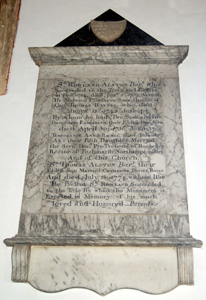Odell Manor
Volume III of the Victoria County History for Bedfordshire, published in 1912, gives details of Odell Manor. The manor was held by Walter the Fleming at the time of Domesday Book in 1086. Until 1632 the manor was held as part of the Barony of Odell and so followed the same succession:
- Walter the Fleming;
- Walter de Wahull, son of Walter the Fleming;
- Simon de Wahull, son of Walter - flourished around the middle of the 12th century;
- Walter de Wahull son of Simon, Baron by 1160 and until at least 1172;
- Simon de Wahull, son of Walter - died before 1197;
- John de Wahull, son of Simon - a minor until at least 1206; died about 1217;
- Rose, wife of Robert Lisle and Agnes, wife of Robert Basingham (later William Fitz Warine), sisters of John; Rose died in 1222 without issue, leaving Agnes Baroness in her own right, she died in 1238;
- John de Basingham, son of Agnes - died 1239;
- Saher de Wahull, son of Walter and brother of the Simon who died before 1197 - he died in 1250;
- Walter de Wahull, son of Saher - born 1227, died before 1269;
- John de Wahull, son of Walter - died 1296;
- Thomas de Wahull, son of John - died 1303;
- John de Wahull, son of Thomas - born 1302, died 1336;
- John de Wahull, son of John - born about 1320, died 1348;
- John de Wahull, son of John - a minor on succeeding to the title, died 1367;
- Elizabeth and Eleanor de Wahull, daughters of John - born 1364 and 1365 respectively, both died 1376;
- Nicholas de Wahull, son of the John who died in 1348 - he died in 1410;
- Thomas de Wahull, son of Nicholas - born about 1387, died in 1421;
- Thomas de Wahull, son of Thomas - died in 1441;
- John de Wahull, son of Thomas - born 1436, died in 1490;
- Fulk de Wahull, son of John - died in 1511;
- Nicholas de Wahull, son of Fulk - died in 1531;
- Anthony de Wahull, son of Nicholas - died in 1542;
- Agnes de Wahull - born seventeen days before her father's death; she married Richard Chetwood who died in 1560 and then Sir George Calvely; Agnes died in 1576;
- Richard Chetwood, son of Agnes de Wahull and Richard Chetwode - a minor on succeeding his mother.
In 1632 Sir Richard Chetwood and Dorothy, his wife, conveyed Odell Manor to trustees before selling it to William Alston the following year. Odell Manor then became the main part of The Odell Castle Estate.
William Alston was a lawyer of Suffolk ancestry who belonged to Inner Temple and was Keeper of Writs in King's Bench, a post of considerable profit and some standing. He was described by contemporaries as a pious and charitable man and certainly he made a bequest of plate and fittings to the church on his death in 1638. Alston was unmarried and the Odell Castle Estate passed to his brother Thomas, also a lawyer of Inner Temple. He was created a baronet in 1642, the year in which he was High Sheriff of Bedfordshire - also the year in which the First Civil War broke out.
Thomas' immediate successors were all Baronets and his wife, Elizabeth, was a daughter of Sir Rowland Saint John and thus sister of three successive Lords Saint John of Bletsoe. Sir Thomas died in 1678 and was succeeded by his younger son Rowland, the elder son having predeceased his father. Sir Rowland died in 1697 and was succeeded by his son Thomas who was one of the Members of Parliament for Bedford Borough from June 1698 to January 1701 and he died, unmarried in 1714. His brother Rowland succeeded him. Sir Rowland sat as a Member of Parliament for Bedfordshire from 1722 until 1741 and died in 1759 aged eighty, his son Thomas succeeding him.

Sir Rowland Alston's memorial in Odell church June 2008
Sir Thomas Alston sat as Member of Parliament for Bedfordshire from 1747 until 1761 and died in 1774. He was the last baronet as his son, also Thomas, was born out of wedlock to a Margaret Lee. Thomas junior inherited the Odell Castle Estate along with Odell Manor but not the baronetcy which then became extinct. When Thomas junior died in 1823 his son Justinian inherited the estate and his son Crewe succeeded him, dying in 1901. A succession of Law of Property Acts in the 1920s abolished manorial fines and incidents as well as copyhold land tenure, thus abolishing manors in practically all but name.